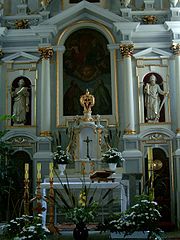
A History Of The Mass And Its Ceremonies In The Eastern And Western Church -Rev John O'Brien A.M.
HOLY COMMUNION IN ANCIENT TIMES
In the early days of the Christian Church’s existence the people were accustomed to communicate every time they assisted at Mass; and many would do this frequently on the same day, if they assisted at more Masses than one and were still fasting. St. Jerome says in his Epist. 1 to Pammachius that this praiseworthy custom prevailed throughout Spain and at Rome in the fourth century. By degrees, however, the practice went so much into desuetude that St. John. Chrysostom, who died in the early part of the fifth century, bitterly complained of it to his people. “In vain,” said he when Bishop of Constantinople, “is there a daily oblation when there is no one present to communicate.” Notwithstanding all attempts to check it, coldness in this respect went on increasing from day to day and from year to year, until the Church found it necessary to enact laws requiring all to approach Holy Communion at least on Sundays and festivals. We see a statute in the Capitulary of Charlemagne (l. v., No. 182) strictly enjoining this practice. In course of time still greater latitude was given, for it was only required that a person should communicate at three special periods of the year—viz., on Christmas day, Easter Sunday, and Pentecost. The decree specifying these three occasions was promulgated by the Council of Tours in the ninth century, during the pontificate of Pope Leo III. The Council of Agatho, held some time before, ordained that those who did not approach the Blessed Eucharist on these occasions should not be looked on as Catholics at all (Romsee, p. 309). This practice continued until about the thirteenth century, when the fourth Council of Lateran, A.D. 1215, held under the auspices of Pope Innocent III., solemnly declared and decreed, under pain of excommunication, that all the faithful who had reached the years of discretion should confess their sins at least once a year and approach Holy Communion within the Paschal time. This solemn injunction was confirmed and renewed by the Council of Trent, which said in its twenty-second session that it desired that the faithful should communicate not only once a year, but every time they assisted at Mass, if their consciences were pure and guiltless before God. Practical Catholics now, as a general rule, approach Holy Communion the first Sunday of every month and on every intermediate festival of note. Many have the pious practice of going once a week; and it is not unfrequent, thank God! to meet tri-weekly communicants.
Copyright ©1999-2023 Wildfire Fellowship, Inc all rights reserved

 Keep Site Running
Keep Site Running